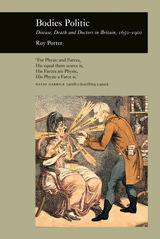

In the 1850s, "Drapetomania" was the medical term for a disease found among black slaves in the United States. The main symptom was a strange desire to run away from their masters. In earlier centuries gout was understood as a metabolic disease of the affluent, so much so that it became a badge of uppercrust honor—and a medical excuse to avoid hard work. Today, is there such a thing as mental illness, or is mental illness just a myth? Is Alzheimer's really a disease? What is menopause—a biological or a social construction?
Historically one can see that health, disease, and illness are concepts that have been ever fluid. Modern science, sociology, philosophy, even society—among other factors—constantly have these issues under microscopes, learning more, defining and redefining ever more exactly. Yet often that scrutiny, instead of leading toward hard answers, only leads to more questions. Health, Disease, and Illness brings together a sterling list of classic and contemporary thinkers to examine the history, state, and future of ever-changing "concepts" in medicine.
Divided into four parts—Historical Discussions; Characterizing Health, Disease, and Illness; Clinical Applications of Health and Disease; and Normalcy, Genetic Disease, and Enhancement: The Future of the Concepts of Health and Disease—the reader can see the evolutionary arc of medical concepts from the Greek physician Galen of Pergamum (ca. 150 ce) who proposed that "the best doctor is also a philosopher," to contemporary discussions of the genome and morality. The editors have recognized a crucial need for a deeper integration of medicine and philosophy with each other, particularly in an age of dynamically changing medical science—and what it means, medically, philosophically, to be human.

This dazzling and yet intimate book is the first modern one-volume history of London from Roman times to the present. An extraordinary city, London grew from a backwater in the Classical age into an important medieval city, a significant Renaissance urban center, and a modern colossus. Roy Porter paints a detailed landscape--from the grid streets and fortresses of Julius Caesar and William the Conqueror to the medieval, walled "most noble city" of churches, friars, and crown and town relationships. Within the crenelated battlements, manufactures and markets developed and street-life buzzed.
London's profile in 1500 was much as it was at the peak of Roman power. The city owed its courtly splendor and national pride of the Tudor Age to the phenomenal expansion of its capital. It was the envy of foreigners, the spur of civic patriotism, and a hub of culture, architecture, great literature, and new religion. From the eighteenth through the twentieth centuries, London experienced a cruel civil war, raging fires, enlightenment in thought, government, and living, and the struggle and benefits of empire. From the lament that "London was but is no more" to "you, who are to stand a wonder to all Years and ages...a phoenix," London became an elegant, eye-catching, metropolitan hub. It was a mosaic, Porter shows, that represented the shared values of a people--both high and low born--at work and play.
London was and is a wonder city, a marvel. Not since ancient times has there been such a city--not eternal, but vibrant, living, full of a free people ever evolving. In this transcendent book, Roy Porter touches the pulse of his hometown and makes it our own, capturing London's fortunes, people, and imperial glory with brio and wit.
READERS
Browse our collection.
PUBLISHERS
See BiblioVault's publisher services.
STUDENT SERVICES
Files for college accessibility offices.
UChicago Accessibility Resources
home | accessibility | search | about | contact us
BiblioVault ® 2001 - 2024
The University of Chicago Press









